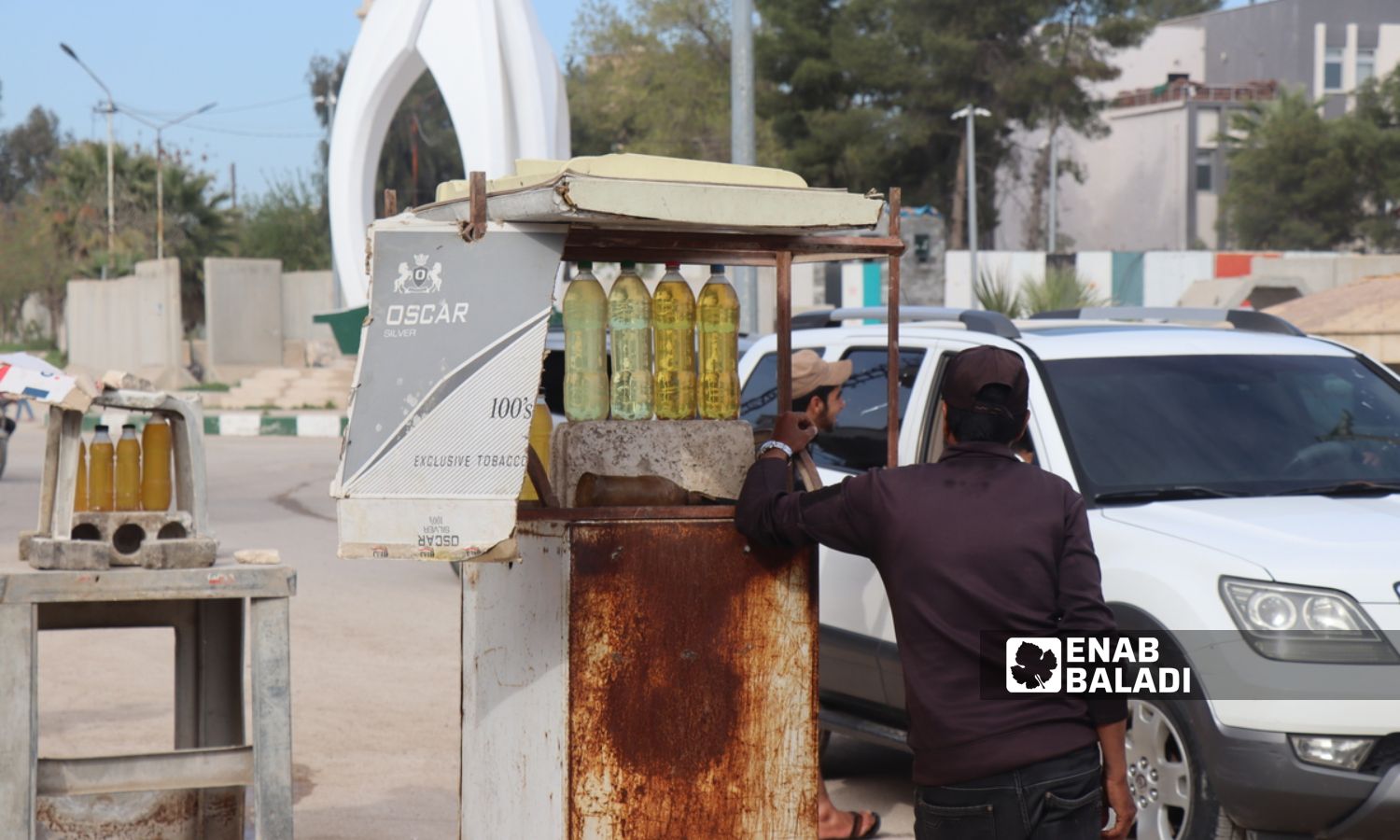



Enab Baladi – Ras al-Ain
As you wander around the city of Ras al-Ain, northwest of al-Hasakah, it is impossible to overlook the sight of fuel stalls on the sides of roads, which have become a source of livelihood for a large segment of the population amidst deteriorating living and economic conditions.
During a tour in the center of Ras al-Ain, Enab Baladi’s correspondent counted more than 30 fuel stalls, in addition to three main fuel stations.
Securing a job with a good income is not easy in Ras al-Ain, as most of its population of 115,000 mainly relies on agriculture and then livestock farming, with few other options.
Daily wages range between 30,000 and 40,000 Syrian pounds (approximately two and a half dollars), varying according to the number of working hours and the type of job, whether it be agricultural or construction.
Emad al-Ragheb has been working at a fuel stall in Ras al-Ain for a year and a half non-stop, as he says, starting from seven in the morning until eight at night to provide for his family’s needs, adding that his daily earnings from selling fuels reach 150,000 Syrian pounds.
He explained that working at the stall has a good income compared to other daily jobs, noting that his profits come from people’s trust in the quality of the fuels he sells, which do not cause breakdowns to cars or motorcycles.
Salwan al-Naseri (25 years old) told Enab Baladi that he has been working at a fuel stall since 2020 because of the scarcity of jobs and low salaries, stating that the stall does not require high costs and does not need to rent a shop, as he works by the roadside.
He clarified that he is a university graduate with a degree in mathematics and tried to find a suitable job, but he did not have the opportunity to work with local entities or organizations due to the limited job availability.
He mentioned that he would leave the stall if a job opportunity matching his field was available, offering an income sufficient to meet the needs of his family of six.
Odai al-Radwan (14 years old) works alongside his mother at a fuel stall in Ras al-Ain. He told Enab Baladi that his father died of a heart attack six years ago, and with no other family provider, he and his mother were forced to sell fuels at the National Hospital roundabout.
The boy strives to secure the basic necessities and provide medicine for his diabetic mother, noting that he tried to work as a daily laborer, but the highest wage he received was 13,000 Syrian pounds, which is not enough to buy bread as he says.
Owners of fuel stations consider that the workers at the stalls infringe on their profession and operate haphazardly without organization, claiming that these workers are a major reason for the reduced turnout at their stations due to the lower selling prices.
Farhan al-Ali, a fuel station owner in Ras al-Ain, told Enab Baladi that the stalls have caused financial losses to the stations because they are widely spread around Ras al-Ain.
He explained that the stalls see more turnout than the city’s fuel stations due to the variety of fuel sources they bring from the “earthen barrier,” the area separating the Syrian National Army (SNA) and the Syrian Democratic Forces (SDF).
Fuel is transported via traders from SDF-controlled areas and discharged near the barrier on a tank located inside the National Army’s territory.
He added that daily laborers go by motorcycles to the Alaliya area, south of Ras al-Ain, and get fuel from traders who operate similarly on the other side within SDF-controlled areas. They bring fuel via their motorcycles and sell it to the stall owners at prices lower than the stations.
Al-Ali mentioned that the prices of fuel at the stalls are lower as the owners do not bear the cost of transportation in tankers, rent for the stations, labor, and the station’s operational costs.
The authorities concerned have been requested to work on removing all the widespread stalls in Ras al-Ain, as they are unlicensed and have caused financial harm and losses to the station owners.
Station owners obtain fuel from the same source as the stall owners, but through tankers, which increases their costs.
There are no fixed prices for fuel in Ras al-Ain, as they are subject to constant fluctuations due to the scarcity of supplies and difficulty in securing them from SDF-controlled areas through illegal means (smuggling).
A liter of butane gasoline sells for 17,000 Syrian pounds, distillate for 16,000 pounds, regular gasoline (refined at local refineries) for 13,000 pounds, and European and Turkish gasoline for 55 Turkish liras (the Turkish lira equals 425 Syrian pounds).
A liter of regular diesel (refined at local refineries) sells for 12,000 pounds, distilled diesel and heavy diesel used for heating and cooking for 10,000 pounds, and European and Turkish diesel for around 40 Turkish liras.
The price differences between fuels at the stall and at the station range from 1,500 to 2,000 Syrian pounds per liter.
Periodically, Ras al-Ain experiences fuel crises, the most notable of which occurred in August 2023, when the city and its wide countryside faced a significant shortage in fuels due to the interruption of most types.
Ras al-Ain and Tal Abyad lie along the Turkish border, controlled by the Syrian National Army, and are surrounded by frontlines with the SDF. The Turkish border stands as their only exit towards the outside.
if you think the article contain wrong information or you have additional details Send Correction